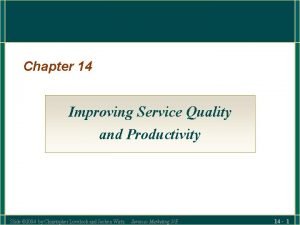Social Franchising Improving quality and expanding contraceptive choice




















- Slides: 20

Social Franchising Improving quality and expanding contraceptive choice in the private sector

Overview 1. Introduction to the High Impact Practices (HIPs) • What is a HIP? • HIP Categories • Partnership PART • PART Background 2. Social Franchising • Theory of Change • What challenges can this HIP help address? • Evidence of Impact 3. Extra Slides • Priority Research Questions • Implementation Tips • Tools & Resources 11 Social Franchising 02

High Impact Practices in Family Planning (HIPs) are… Evidence-based family planning practices Social Franchising Vetted by experts against specific criteria Documented in an easy-to-use format 03

HIPs address the full spectrum of FP programming Enabling Environment Service Delivery Address systemic barriers that Improve the availability, Influence knowledge, beliefs, affect an individual’s ability to accessibility, acceptability, behaviors, and social norms access family planning and quality of family planning associated with family planning. information & services. 6 briefs services. 8 briefs 3 briefs PART Social and Behavioral Change Enhancements Approaches used in conjunction with HIPs to maximize the impact of HIP implementation or increase the reach. 4 briefs Social Franchising 04

HIP Partnership The Technical Advisory Group (TAG) is made up of 25 experts in family planning, including representatives from the co-sponsors. The Co-sponsors include the following organizations: Social Franchising 05

High Impact Practice Organize private providers into branded, quality-assured networks to increase access to provider-dependent contraceptive methods and related services. Social Franchising 06

Background A social franchise is a network of private-sector health care providers that are linked through agreements to provide socially beneficial health services under a common franchise brand. This type of network can be particularly important for expanding availability and improving the quality of family planning services in the private sector. Social Franchising 07

Theory of Change BACKGROUND Social Franchising 08

What challenges can this HIP help countries address? • Social franchising can improve the quality of clinical family planning services delivered by private sector providers. • Social franchising can bring more family planning clientele to participating private-sector clinics. • Social franchising supports access to and voluntary use of longacting and permanent methods. • Social franchising can support coordination of independent private providers with public health systems in support of goals like Universal Health Coverage. Social Franchising 09

Evidence of Impact Evidence Summary of the Effect of Social Franchising on Modern Contraceptive Use 05 Social Franchising 10

Evidence of Impact • There may be greater impact when combining social franchising with a voucher program. • Social franchising helps private providers incorporate adolescent-responsive contraceptive services. 05 Social Franchising 11

Social franchising is a promising practice A promising practice has limited evidence, with more information needed to fully document implementation experience and impact. The advisory group recommends that such promising interventions be promoted widely, provided they are implemented within the context of research and are carefully evaluated in terms of both impact and process. 05 Social Franchising 12

Thank You Continue to the extra slides or access the HIP brief for more information. Social Franchising 13

Extra Slides Priority Research Questions Implementation Tips Tools & Resources Social Franchising 14

Priority Research Questions • What is the effect of social franchising on contraceptive prevalence in communities served by social franchise clinics? • What is the differential impact on contraceptive use of social franchising with and without a voucher component? • What are the associated costs with maintaining a social franchise? 05 Social Franchising 15

Implementation Tips Box 1. Health Market Conditions That Likely Lead to Social Franchising Success Assess health market conditions. • The private medical sector, especially the outpatient sector, has adequate infrastructure and human resource capacity • Poor and underserved client groups currently seek care from private providers • The public sector is overburdened and/ or unable to adequately address unmet need for family planning • The government is interested in and supportive of developing, regulating, or contracting the private sector • Clients or third-party payers are willing to buy health services offered in small or midsize private-sector outlets • Clients or third-party payers are able to pay for services, either through out-of-pocket payments, health insurance, or other demand-side financing schemes • Adequate resources are available for franchise set-up and ongoing management • The policy environment is favorable to task sharing whereby mid-level providers can offer the franchised package of services Social Franchising 16

Implementation Tips • Seek opportunities to engage large social franchise networks and geographic coverage. • Recruit franchisees selectively. • Identify franchisees that have underutilized capacity to maximize health impact. • Clarify expectations and commitments between franchisor and franchisee at the outset. • Take into account client service volumes of each franchise. Social Franchising 17

Implementation Tips • Consider offering a broad range of services as part of the franchise package. • Meet the needs and preferences of female and male clients under age 25 by including youth-friendly contraceptive services. • Consider demand-side subsidies, such as vouchers or participation in health insurance, to effectively serve youth and clients from the lowest income quintiles. Social Franchising 18

Tools & Resources Social Franchising for Health e-Learning Course 05 Total Market Approach to Family Planning Services e-Learning Course Social Franchising Clinical Social Franchising Compendium 19

fphighimpactpractices. org
 Nidation
Nidation Mama methode contraceptive
Mama methode contraceptive Contraceptive
Contraceptive Evonid
Evonid Neten contraceptive
Neten contraceptive Oars communication
Oars communication Improving service quality and productivity ppt
Improving service quality and productivity ppt Methods of improving quality business a level
Methods of improving quality business a level Service design gap
Service design gap Gaps model for improving service quality
Gaps model for improving service quality Good choice or bad choice
Good choice or bad choice Licensing franchising and other contractual strategies
Licensing franchising and other contractual strategies Advantages and disadvantages of franchising
Advantages and disadvantages of franchising Franchising co to je
Franchising co to je Introduction to franchising
Introduction to franchising Advantage of franchise
Advantage of franchise Business format franchise
Business format franchise Franchising in retailing
Franchising in retailing Introduction to franchising pdf
Introduction to franchising pdf Bbc bitesize franchising
Bbc bitesize franchising Objectives of franchising
Objectives of franchising






































